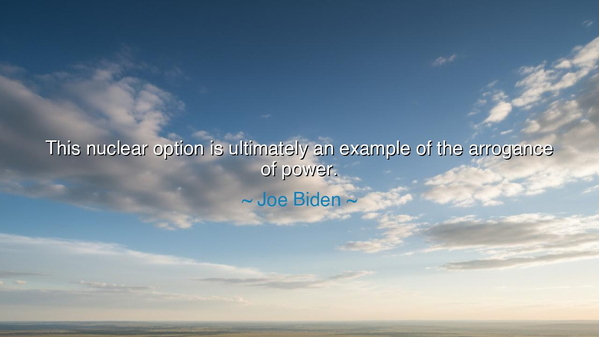
This nuclear option is ultimately an example of the arrogance of






In this declaration, Joe Biden warns of the destructive consequences of what he calls the nuclear option, a metaphor for extreme political tactics that break long-standing rules and traditions. His words are not about literal weapons, but about decisions so drastic they leave no path for reconciliation. By calling it an example of the arrogance of power, he highlights the danger that arises when leaders act without humility, believing themselves above balance, fairness, and the lessons of history. Such arrogance blinds rulers to the long-term damage they inflict upon the very systems they are sworn to protect.
The phrase nuclear option was famously used in the United States Senate to describe the changing of filibuster rules, allowing a simple majority to confirm appointments rather than a supermajority. This action, while legal, shattered a tradition of cooperation and consensus that had endured for generations. Biden’s warning was not merely about procedure, but about the spirit of governance. When those in power abandon restraint, they create a cycle of retaliation, where today’s victory becomes tomorrow’s downfall. It is a lesson that unchecked power inevitably turns inward, consuming its wielder.
History offers countless examples of the arrogance of power. In ancient Rome, Julius Caesar crossed the Rubicon, defying the Senate and plunging the republic into civil war. His ambition and disregard for tradition destroyed centuries of balanced governance, leading to the rise of emperors and the eventual collapse of the empire. Similarly, during the French Revolution, the ruling elite’s refusal to listen to the people led to their own destruction, as the fury they ignored boiled over into chaos and bloodshed. These stories reveal a universal truth: when leaders confuse authority with invincibility, they sow the seeds of their own ruin.
Biden’s words also serve as a call to humility. Power is not meant to be wielded like a weapon, but to be tempered with wisdom and guided by the common good. The arrogance of power arises when rulers see themselves as masters rather than servants, when they forget that authority is granted by the people and can just as easily be taken away. His warning is a plea to remember that even in politics, restraint is a form of strength, and compromise a form of courage.
Thus, his reflection becomes a timeless teaching for future generations. Whether in governments, families, or communities, the temptation to seize absolute control must be resisted. The nuclear option, whether political or metaphorical, may bring short-term triumph, but at the cost of lasting harmony. True leadership lies not in the destruction of opposition, but in the building of bridges, the nurturing of trust, and the preservation of the delicate structures that bind societies together. In this way, the wisdom of history speaks through Biden’s words, urging us to choose humility over hubris, and balance over reckless might.






TNThanh Nguyen
Joe Biden’s comment on the nuclear option touches on an important issue about the dangers of unchecked power. It’s alarming to think that such decisions could be driven by arrogance rather than careful consideration of consequences. But how much of this is inherent in political power? How can we ensure that leaders remain grounded and avoid letting their authority blind them to the potential repercussions of their actions?
BKBao Kha
I completely agree with Joe Biden’s critique of the nuclear option. Power often distorts judgment and can lead to reckless decisions. But I can’t help but wonder: when does power start to lose sight of the human cost? How can we prevent leaders from viewing such drastic measures as solutions rather than seeing the potential dangers they pose? Is there a way to instill humility in those who hold such power?
MCmai chi
Biden’s comment about the nuclear option being an example of power’s arrogance is really thought-provoking. It makes me question: where do we draw the line between strength and overreach? At what point does power become too dangerous, and how do we ensure that those who wield it do so responsibly? The idea of arrogance in leadership is something we must always be cautious of, especially when it has the potential to affect millions of lives.
MKMay Kim
Joe Biden’s statement about the nuclear option as an example of the arrogance of power really highlights how dangerous unchecked authority can be. It makes me think—what are the long-term consequences when powerful leaders make decisions without regard for the broader impact? How often do we allow power to overshadow accountability, and how can we prevent such arrogance from leading to irreversible decisions?